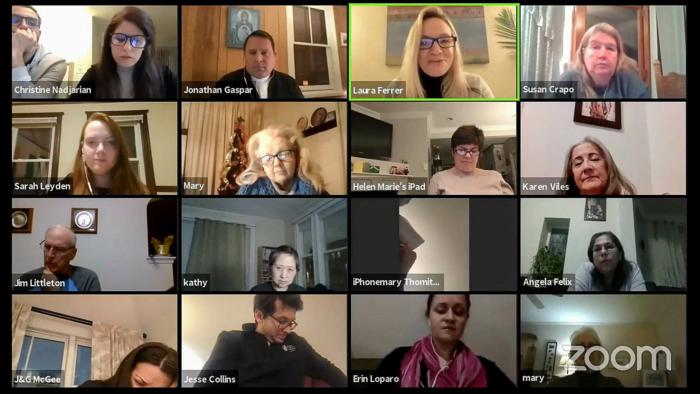Local
Brookline parish seminar addresses pandemic's 'enormous toll' on mental, spiritual health
By Jacqueline Tetrault Pilot Staff
Posted: 2/19/2021


Father Jonathan Gaspar and Dr. Laura Ferrer (top row, center) of St. Mary Parish, Brookline, lead the virtual seminar on spiritual and mental wellbeing Feb. 9. Pilot screen capture
BROOKLINE -- St. Mary of the Assumption Parish hosted a virtual seminar on Feb. 9 about the twofold issue of spiritual wellbeing and mental wellbeing, providing advice, encouragement, and practical strategies for prayer and self-care.
Dr. Christine Nadjarian, the parish's religious education director, said they organized the event because they saw "a deep need for it among community members" during the coronavirus pandemic.
"We wanted to provide some psychological and spiritual support to help build and sustain healthy habits during these difficult times," she said in a Feb. 12 email to The Pilot.
Over 40 people participated in the event, which was held via Zoom. The main speakers were the parish's pastor, Father Jonathan Gaspar, and parishioner Dr. Laura Ferrer, a clinical psychologist who teaches at Harvard Medical School/McLean Hospital.
Father Gaspar said he has heard from many people suffering as a result of the pandemic, which has forced people to self-isolate, disrupted routines, and cut off support systems.
"This pandemic has had an enormous toll on people's mental health, and I thought it was important for us to address it head-on," he said.
He pointed to how the stories and poems of the Old Testament vividly illustrate the reality of suffering and contrasted this with how other religious traditions try to explain it.
"Religion, in general, has always sought ways to answer those difficult questions surrounding suffering: Why do bad things happen to good people? Why do the innocent suffer? Why do people I love suffer?" Father Gaspar said.
He said he often offers the psalms as a guide for how to pray during a time of suffering.
"The psalms often can help us in our prayers because the psalms run the whole gamut of the human experience. There are psalms of praise and thanksgiving, and there are psalms that arise from a place of pain," he said.
He pointed out that even the psalms about suffering ultimately express hope, calling upon God to intervene.
"Our prayer from grief always should lead us to a place of hope that God (will) arise and do something," Father Gaspar said.
He quoted the French writer Paul Claudel, who said, "Jesus did not come to explain away our suffering or remove it. He came to fill it with his presence."
Father Gaspar explained that the Incarnation shows God is not indifferent to human suffering. In the Gospels, Jesus performs miracles in direct response to people's pain, as in cases of healing, and physical needs, such as the multiplication of the loaves and fishes.
"Sometimes, we think because we're religious people or we have faith that we shouldn't suffer, or if we are suffering, then we're just doing something wrong. And that couldn't be farther from the truth," Father Gaspar said.
Part of the witness of the saints, he said, was that "they were able to find God in darkness, in the dark moments of life. And that's what we're being called to do these days."
While Father Gaspar's talk focused on prayer and spiritual life, Ferrer spoke about mental health and how it relates to physical and emotional wellbeing. She listed 10 strategies for improving mental health and led the seminar participants in some exercises that can be done at any time.
Ferrer spoke about identifying "foundations" -- basic needs like nutrition, adequate sleep, physical movement, and social support. She suggested identifying five things necessary to feel "balanced" over the course of a week.
"When these things are not in balance, we are much more vulnerable to feeling the effects of distress in our lives," she said.
Ferrer also talked about differentiating between circumstances within one's control and those beyond one's control, to avoid getting caught up in anxiety over uncontrollable circumstances. She suggested having a few priorities each day regarding things one can control.
She named a few strategies for positive thinking: practicing gratitude, which should be specific and savor the emotion of a moment; cultivating positive associations, such as by displaying photographs or mementos that trigger happy memories; and "emptying" or "releasing" emotions through art, music, or journaling.
Ferrer said helping others can be a good way to feel better about both oneself and other people.
"Some research has found that if we do a favor, help out someone that we don't feel so great toward, we will then feel better toward them," she said.
Ferrer closed by talking about her favorite strategy, which is also the most ostensibly simple one: breathing.
"I never fail to be impressed by the power of good, diaphragmatic breathing to settle the mind and the body. And that's something you can do anytime, anyplace," she said.
She explained that daily stressors trigger the body's stress hormones throughout each day. Deep breathing can help counter that physical response.
"Taking a deep breath actually helps to cue the brain and the body to shut the stress response down and to get back into the relaxation response. So even though it's a simple act, a whole cascade of really impressive, amazing things go on," Ferrer said.
Father Gaspar added to this some examples of meditative prayer that can be synchronized with breathing, such as the Jesus Prayer and the rosary.
"Prayer and meditation have a tremendous effect on that resetting that Laura (Ferrer) is talking about," he said.
The workshop ended with a question-and-answer session for those in attendance. Ferrer also shared a list of crisis hotlines in Massachusetts that are available 24/7.
A recording of the meeting can be viewed at facebook.com/groups/stmarysbrookline/permalink/3877584215620827.